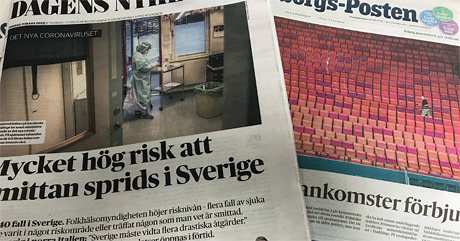
“In the last few days, people have received very good and, as far as I can judge, correct information, through both public service channels and private news media, which have all been very active. Responsible public authorities have been given lots of attention in the media for their massive information campaigns. They have also been faced with critical questions, and that’s as it should be in a democratic society.”
Tomas Odén emphasises the importance of the news media not serving as the long arm of public authorities. That’s how a totalitarian state works. Here, citizens should be able to trust that the media asks the questions they want to ask and does not just ask questions that the authorities want asked.
In Sweden, these questions have dealt with prohibiting public events, and whether schools should be open or closed, and why the authorities have acted differently in some cases than in countries like Denmark and Italy. This has given the authorities an opportunity to explain why crisis management has been handled the way it has.
Recognises the pattern
Tomas Odén and his colleagues have not yet conducted a scholarly study of the media’s reporting on the coronavirus, but he already recognises the pattern.
“Initially, the authorities’ positions and actions are reported on without critical questions. In the second phase, where we are now, critical voices come to the fore, like doctors who have differing views about what should be done. That’s how it usually is, and that’s the case now. Editorial comments have also been critical to some extent of the authorities’ reluctance to act. These opinions are present in society and it’s important they can be expressed, but it is also naturally important that the authorities have the opportunity to respond and comment on the criticisms.”
When the authorities present new measures, the media is once again loyal and reports on them. After a time, they begin asking critical questions, such as if they do not see an effect or that other countries are acting differently. The third and final phase depends on how the crisis plays out, but the normal pattern is for the media to shift to critical analysis, possibly with questions demanding responsibility if something goes obviously wrong. Did the authorities make the best choices, what mistakes were made, etc. But that phase is a bit off into the future, perhaps we will see it in a few months or even a year, according to Odén.
Social media also has an important role for reporting the news. They spread information and comments, something that the news media are good at picking up and turning into news. The news media also disseminates its own news via social media, so it serves both as a source of information and as a platform.
“During this type of event, media often provide platforms for discussions and they have done so this time as well. Several media have had individuals from public authorities on or other experts where readers, listeners and audiences can ask questions.”
Differences and similarities
Tomas Odén and his colleagues at the Department of Journalism, Media and Communication (JMG) have previously conducted several studies on media reporting during crisis situations, and they see both similarities and differences with, for example, the Swine Flu in 2009.
“We saw that Swedish media were very close to the authorities at the time, they agreed to the terms set by the authorities more than what media in other countries did, such as in Italy and England, which we compared. We discovered that the news media in those countries had a type of journalism that was much more critical to the actions of their own public authorities.”
The Swedish media’s attitude was appreciated by the authorities, but also led to some having problems critically examining and demanding responsibility after the fact. It is easier to demand responsibility if you have not been a part of the campaign that took place.
“There are fairly major similarities between then and now, but media today seem to be more focused on maintaining a distance to the authorities so they can ask critical questions. At the same time, there is a loyalty to the authorities’ actions and what messages they want to get out.”
Other information
Tomas Odén, together with colleagues at the Department of Journalism, Media and Communication (JMG), has researched how public authorities, media and citizens react and communication in times of crisis, such as the Swine flu epidemic in 2009 and the Ebola outbreak in 2014. A research project has been conducted on the importance of digital media for communication in connection with societal crises and disasters.
